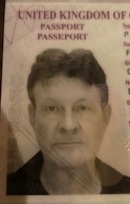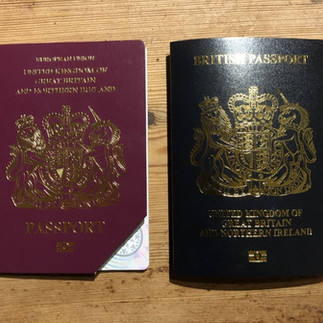Passport to Pimlico
- colinfell6

- Nov 28, 2021
- 4 min read
Updated: Nov 29, 2021
My first passport was to me a thing of wonder. Robust, and black, it felt like a small book, expressive of a nation state which still felt as though it should be ruling the world’s waves, and whose citizens should be able to pass through the world’s ports without much more than a careless wave of the hand; and, of course, a book where a life could be written in stamps. Inside there is a photograph of a chubby teenage me, frowning dutifully at the camera in what I probably thought was a profound and serious manner. Later I acquired the burgundy passport of the European Union, a name which still feels raw to me, raw with the sense of loss. These were flimsier, offering an easy target for the Europhobes, who, summoning mental images of sceptered isles, muttered darkly of diminished sovereignty. I rather liked my new passport’s lightweight flexibility; it appeared to me to express an easiness about the idea of travel, of national identity, of borders. No Napoleonic blockades or cold war sentries shuffling suspiciously, no intimidating border guards, just an ease, or freedom, of movement from one geographical and cultural entity to another.
I have always liked the passport; its sheer physicality and the simplicity have always appealed to my imagination. Its name evokes timeless, universal images, of exotic buccaneering travellers emerging salt- stained from sea crossings, seeking an inn before heading into a dark hinterland; although also political frontiers, those arbitrary rulings of lines across empty space made by old men in dark rooms dripping sealing wax onto documents signed with a flourish. It is far preferable to its distant cousin, the identity card. I’ve never much warmed to the idea of identity- far too easily condensed, simplified, and in the present day, too easily stolen; he who steals my purse steals trash, as Iago might have put it. There’s also the sense that its real purpose is to satisfy the demands of a probably suspicious state machine; in B.Traven’s anarchic 1926 novel Das Totenschiff, the character Gerald Gales wanders the world without official papers; “even though you’re standing before me”, an official tells him, “without your identity papers you don’t exist”. And for those unfortunate souls like my grandfather, condemned to fight the 1914-18 wars of a fragmented and fragmenting Europe, identity was something conveniently condensed into a tiny disc of aluminium, a couple of centimetres in width. It contained no more than an initial, a family name, official religion, and regimental number; in the event of the atomisation of its wearer, it could, theoretically, be retrieved to provide evidence that a particular identity had been eliminated from the world’s collective consciousness. The passport makes no lofty claim to definition of something as metaphysical as who we are, contenting itself with the far simpler and friendlier purpose of allowing us to move freely, essentially to be unconstrained by the accident of our birthplace.
I have just renewed my passport, in what has become, like so many things beyond the age of fifty, an intimation of the resolute passage of time; and with commendable speed, the office in Swansea returned my new one; no longer the EU burgundy, but back to sturdy black. And yet this seems to me no cause for rejoicing; what seemed to my teenage self an enabling of freedoms and rights, now appears a diminution. The United Kingdom proudly proclaimed on its cover feels transitional, and there’s a reminder that like all political entities, it’s contingent, not absolute, as Scotland, to which I’m bound by blood and spirit, seeks its freedom. And where once its power was to open doors abroad easily into other worlds, now it appears weakened; funnelled punishingly through our separate queue at Dover, we have only our separateness to offer. After the most myopic political decision of my lifetime, our isle has never felt more sceptered, or sequestered, as news reports emerge of our friends from mainland Europe being challenged by suspicious border guards, and Priti Patel seriously suggests turning away, in defiance of maritime law, boat loads of fragile and deeply vulnerable people fleeing countries often negotiating the legacies of empire.
Our offices, businesses, classrooms, hospitals, restaurants, farms, care homes, fall empty, and the young people with whom I’m lucky enough to work, find it harder to travel, to study or to work; their pass ports are, quite simply, worth less than they were. Young musicians can no longer head off across the channel with a guitar or a clarinet, or violin, and charm their way Orpheus like around the continent, without prohibitive reams of paperwork, not only for themselves but for their instruments; music, the international language, is at the mercy of the bureaucrats if it is to cross the channel. In the 19th century, Britain was known as Das land ohne Musik; sequestered and silent, and with music squeezed out of school life, we may become so again.
When my father, an inveterate believer in universal freedoms, died, I remember his brother, a provincial bank manager, declaring “I don’t like abroad. I never have.” Now policy is made by those who agree with him, and we’re all the worse for it. A regular fixture on BBC during my childhood was the1949 Ealing comedy, A Passport to Pimlico. In it a Burgundian enclave opens up in central London; as those within it came under siege, they develop a siege mentality and are supported by food parcels thrown over the barbed wire fence by the locals. The film’s comic take on parochialism and national unity seems sadly far from the narrowly exclusive, “hostile environment” created by the Home Office and its Brexit overlords. From a personal perspective, I have developed a sudden and opportunistic enthusiasm for the cause of Scottish Independence. A former sceptic, now, with the zeal of the newly converted, I espy in it a route to the reclamation of lost freedoms. I would shamelessly call upon my Scottish ancestry to exchange the entrenched insularity of a decaying nation state; to bring Europe’s cities, mountains, rivers, and peoples that little bit closer; to deepen and broaden, and render in full colour, my citizenship of a broader community.
And perhaps, to gain a new, lightweight, burgundy passport.









'Entrenched insularity of a dying nation state' ... a masterly phrase filled with equal measure of despair and rage - thanks for this heart felt and heart breaking yowl.